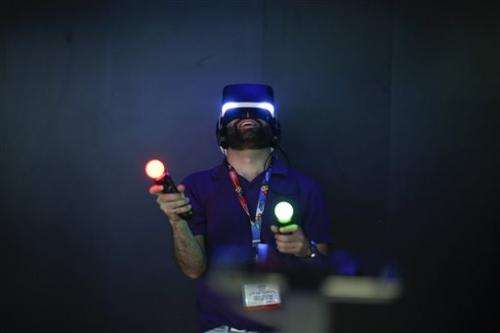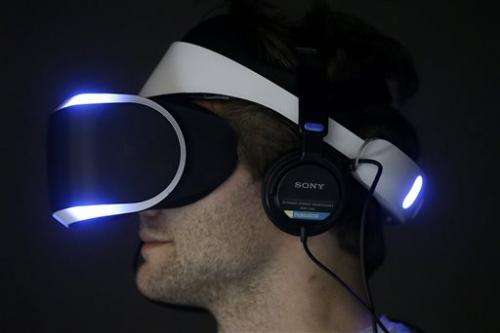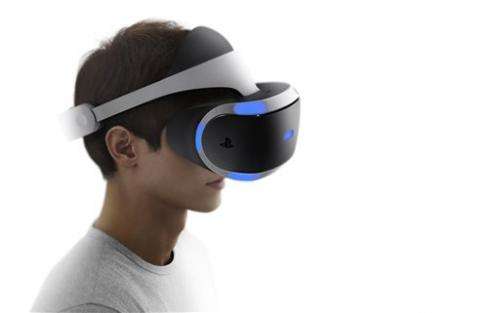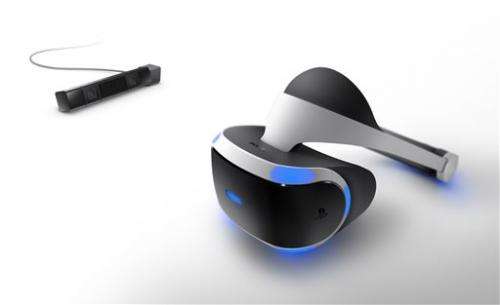For virtual reality creators, a question of control

At the Game Developers Conference, it's easy to imagine what virtual reality will look like when it eventually hits the marketplace. What it will feel like, however, is an entirely different matter.
From wand-shaped controllers to motion-detecting sensors, VR creators are trying out all sorts of input methods on the road to bringing the immersive technology into consumers' homes.
For decades, to interact with virtual worlds depicted on television and computer screens, gamers had to rely on either hand-held controllers with an assortment of buttons, directional pads and analog sticks, or a keyboard coupled with a mouse.
The head-mounted VR displays that intentionally obstruct users' vision are providing new challenges for designers seeking to create a sense of presence on the screen.
While creators agree that boosting frame rates and lowering latency as much as possible are key to achieving realistic imagery that won't leave users feeling queasy, there's no such consensus on just how they should interact with what's displayed inside the goggles.
"For us, it's a choice we want to give the player," said Elisa Di Lorenzo, business development manager at Untold Games, developer of the VR adventure "Loading Human." In the latest demonstration of the game, users can simply look at the direction they want their avatar to move, or more precisely, they can push a joystick on a controller to go there.

During a demo of the latest Project Morpheus VR prototype at this week's annual gathering of game designers, Sony employed a pair of its wand-like PlayStation Move controllers, whose illuminated bulbs are tracked by the PlayStation Camera, to serve as hands in a VR shootout simulation. In another showcase involving toying with tiny robots, a VR rendition of the traditional DualShock 4 controller for the PlayStation 4 could be glimpsed in concert on screen, with floating text indicating each button's duty.
"It really just depends," said Richard Marks, director of research at Sony Computer Entertainment America. "I think with DualShock 4 and Move, we have good coverage for a number of experiences, but it's a big area of research, for sure. It's not done. That's not a problem that's been solved."
Oculus VR, which launched the latest VR frenzy three years ago with the introduction of the first Oculus Rift prototype, has yet to land on a formal control scheme. The headset has been demonstrated at trade events with various controllers.
The most precise and immersive solution could actually be a combination of several different systems. In a demo of the HTC Vive, a newly unveiled headset from the smartphone manufacturer and game distributor Valve, a pair of wand-shaped gizmos similar to Move controllers was matched with a set of motion-detecting sensors positioned on top of shelves at opposite ends of a room.
On screen, the controllers depicted hands in various environments, like a cartoony kitchen and a fantastical dungeon. They also served as floating tools used to create a three-dimensional painting. Meanwhile, the sensors simultaneously tracked the user's movement in a 15-by-15-foot space, with an on-screen grid popping up if an actual real-world wall was nearby.
"When I could walk around the room in the Valve demo, I cared a lot less about the resolution and everything else on screen because it was really intuitive," said Alasdair Coull, head of research and development at Weta Digital. The company partnered with Oculus and Epic Games for a passive VR encounter at GDC with the dragon Smaug from "The Hobbit" films.

Other solutions on display at GDC included the latest rendition of the Virtuix Omni, a treadmill-like contraption that tracks users' feet. At nearly 150 pounds, it's both the bulkiest and safest solution because users' movement is restricted.
"There's are a number of VR games close to being finished, so it's really a question now of if the technology is going to further improve," said Simon Carless, executive vice president at UBM Tech Game Network, which hosts GDC and other technology conferences.
That answer should come soon.

HTC and Valve plan to release Vive later this year, while Sony announced this week that Project Morpheus is due in stores the first half of 2016. Oculus VR hasn't said when the Rift will be available to consumers.
There's another unanswered question looming over all these devices: How much will this cost? No one is saying yet.
-

In this photo provided by Sony Computer Entertainment Inc., Sony Computer Entertainment unveils a new prototype for Project Morpheus, a virtual reality system for PlayStation 4. At the Game Developers Conference, open March 2-6, 2015 in San Francisco, it's easy to imagine what virtual reality will look like when it's eventually released, but what it will feel like is a different matter. From motion-detecting sensors to wand-like controllers, game creators are trying out all sorts of input methods on the road to bringing VR into consumers' homes. (AP Photo/Sony Computer Entertainment Inc.) -

In this photo provided by Sony Computer Entertainment Inc., Sony Computer Entertainment unveils a new prototype for Project Morpheus, a virtual reality system for PlayStation 4. At the Game Developers Conference, open March 2-6, 2015 in San Francisco, it's easy to imagine what virtual reality will look like when it's eventually released, but what it will feel like is a different matter. From motion-detecting sensors to wand-like controllers, game creators are trying out all sorts of input methods on the road to bringing VR into consumers' homes. (AP Photo/Sony Computer Entertainment Inc.)
© 2015 The Associated Press. All rights reserved.




















